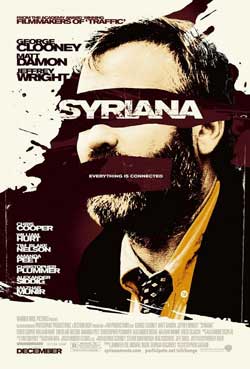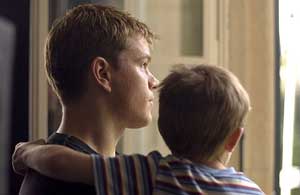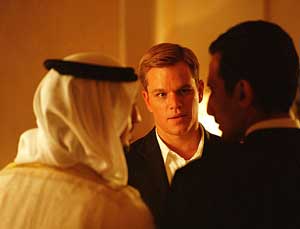 Here’s something I will treasure forever – on my computer I now have a soundfile that includes Matt Damon imitating his Team America puppet. If I had the right tools I would share it with you guys, but take my word on the fact that it’s funny as hell.
Here’s something I will treasure forever – on my computer I now have a soundfile that includes Matt Damon imitating his Team America puppet. If I had the right tools I would share it with you guys, but take my word on the fact that it’s funny as hell.
Damon’s one of those great modern actors who helps me have a lot of faith that our era of filmmaking is going to be looked back at fondly. You know that you can trust his choices are being made for the right reasons, and that you’re not going to see him starring in a cynical piece of crap film.
In Syriana he plays an American living abroad, an energy trader and analyst who is invited to an emir’s birthday party – where his son is tragically and accidentally killed. When the emir’s son, Prince Nasir tries to buy him off, Damon’s character turns the tables and begins helping him plan a new infrastructure for his country that won’t be reliant on Western interests. Things go downhill for them from there.
We talked to Damon a little bit about the CIA, who play a big role in the film, but it’s worth noting how weirdly dominant the Company has been in his career. In fact, early drafts of Good Will Hunting involved heavy CIA thriller elements. There’s the Bourne films, which will soon become a trilogy with The Bourne Ultimatum, and he’s working on The Good Shepard, a film about the history of the CIA. But while spies were old news to him, kids were something new.
Q: So is this your first family man role?
Damon: Yeah, yeah, I think so. First time with children.
Q: Your first time with screen children and something horrible happens to one of them…
Damon: Yeah, it’s such a visceral thing too, that scene in the movie, and as the storylines go, I think it makes my story the easiest to connect to emotionally, at least at first. The stories are all very different, but mine has kind of the biggest punch up front, where as some of them build a lot more obviously then mine. Mine kinda starts with a big bang. I don’t really know what to say about it, because I think that people will probably relate to it differently. Just the image, really the underwater shot looking up at him is really. When I saw it, it’s just…hard to see that… anything happening to children. That City of God feeling where you just go ‘Oh, man.’ It’s hard to watch.
Q: Is that how you approached the role? That you’re the character that we had to come into the film through? Damon: It didn’t really affect how I was playing it, but it was how I thought of it, because it is kind of opaque. It’s a real complicated story and each story is pretty complicated, and mine’s probably the simplest to follow on an emotional line, and the movie needs that to feel more balanced.
Damon: It didn’t really affect how I was playing it, but it was how I thought of it, because it is kind of opaque. It’s a real complicated story and each story is pretty complicated, and mine’s probably the simplest to follow on an emotional line, and the movie needs that to feel more balanced.
Q: Some of us are sick of stupid movies for stupid people. This is a smart movie for smart people, but it may limit the audience.
Damon: I really think it’s about not playing to the lowest common denominator. I think it’s better if you can elevate the discourse a little bit, and I think movie definitely tries to do that. It reminds me of the movies that were made in the 70s. I think the business has obviously changed a lot and movies in general, you have two hours to tell a story, and I think the tendency as an actor or director is to make sure no one is confused, and life isn’t like that. Reading people in real life is really hard, and I think it’s okay if a movie reflects that.
Q: Your character is complicated because he’s fiercely ambitious and he takes an action later which some of us may find morally compromising.
Damon: Yeah, and I like that. I believe it though. It’s not something to judge and go, he’s good, he’s bad. With any of these characters. Two of the heroes of the movie end up blowing themselves up. It’s a real attempt to kind of look at something and try and understand it rather than judge or tell the audience that this is the good guy in the white hat.
Q: How do you explain this guy? Do you think he goes to help Prince Nasir as a way of shutting down his pain?
Damon: My take on it is that he does have ideas that are valid, and he does believe that [the prince] should do business with him and he’s in a place where he’s nihilistic enough to suggest some kind of pretty radical things. He’s at a place where he just lost his son, so yeah, he’s absolutely trading on the death of his son, but not in a… he’s not twisting his moustache. Life is kinda more complicated than that. When he goes to pitch the guy in the first place in Marbella and he gets kind of shut down and he has to pitch the two guys in the hallway, it is kind of embarrassing and humiliating but he does have good ideas, and they should do business with him. He will make them money, and that’s kind of how I think he’s rationalizing it, and then he finds this guy, so they really collide. It’s this collision of ideas where they’re both… Nasir is idealistic enough and Brian’s nihilistic enough that they feed off each other.
Q: Did you do a lot of research for this role, whether it be economics or the oil business?
Damon: I did. Gaghan sent me a bunch of books. I mean, I read Bob Baer’s two books, and then he sent a bunch of other books. Some of them I read and some of them I didn’t have time to read, because I only had a couple months to get ready and I was doing another movie at the time—Ocean’s 12. Which is the other way I got involved because Steven and George were producing, they sat me down and George had already signed up to do it, and he said, ‘Look, I believe in this director.’ Soderbergh said both of them threw their support by Gaghan, and they said to have a conversation with him, because I’m very director-oriented when I choose a movie. So I had a 20-minute conversation with Steve Gaghan after having read the script a couple times, and that was what convinced me to do it because he really has something to say and he’s a really smart guy.
time to read, because I only had a couple months to get ready and I was doing another movie at the time—Ocean’s 12. Which is the other way I got involved because Steven and George were producing, they sat me down and George had already signed up to do it, and he said, ‘Look, I believe in this director.’ Soderbergh said both of them threw their support by Gaghan, and they said to have a conversation with him, because I’m very director-oriented when I choose a movie. So I had a 20-minute conversation with Steve Gaghan after having read the script a couple times, and that was what convinced me to do it because he really has something to say and he’s a really smart guy.
Q: Did you talk to energy traders?
Damon: Yeah, there were a couple guys there. To be fair, economics and math is not my strong suit. I’m a writer, man. I tried, but it’s excruciatingly complicated what these guys really do. I mean, I could not explain it to you. I can give you the peanut butter and jelly version, which was enough to play the guy and know what it was he was doing, but in terms of a lecture on what this guy does…
Q: Do you watch the news differently now? The issues in this film are very relevant to things we see on the news every day.
Damon: I wouldn’t say my opinions are too different. I mean, I may be a little more informed then I was and more curious, actually, then I used to be. I think because it is complicated, I think we tend to be complicit in not wanting to figure it out, and everyone’s kind of getting on with their own lives, and it takes a lot of time and energy to figure out how this is all working. So it was kind of an excuse to do that and study it a little bit, so yeah, maybe I watched the news a little differently now.
Q: What did you think of your puppet in Team America?
Damon: I haven’t talked to those guys since then, not because of that, but because I don’t regularly talk to them. I used to see them when I was out in L.A. and I really like those guys a lot. I went and saw the movie and I thought it was really funny.
Q: Apparently Tim Robbins refuses to see the movie.
Damon: Really? I don’t know. I think it’s all in good fun. I heard in an interview or someone recounted an interview that they had heard those guys give that said that when my puppet showed up, it looked retarded, so they just decided to play me that way, so the only thing I ever say is “Matt Damon!”…I guess that was what happened.
 Q: And you find that funny?
Q: And you find that funny?
Damon: Yeah, I mean it’s silly. It’s certainly not offensive. If it was some other actor, I probably would be laughing too.
Q: Have you ever thought of taking time off from acting to do more writing?
Damon: Yeah, but Ben and I wrote that [Good Will Hunting] in order to get work as actors and that’s happened and that’s been great, and it’s kind of kept us from writing. Although he just adapted Gone Baby Gone, this Dennis Lehane novel that he’s going to direct next year, so he got back on the horse. But I’ve just been running around working. I’ve been really, really busy. I want to. I’d really like to.
Q: What are your thoughts on the CIA, particularly from what we see on this film?
Damon: Well, that’s a bigger question. Well, it’s complicated. For one thing, I mean I think it changes, and I think there are different types of people within the CIA, so you can’t really cast a net over them. By and large, you’re talking about a group of really patriotic people, whose job is to further the interests of their country. CIA guys are basically paid to break the laws of other countries, so foreigners probably really don’t like them because they’re in their countries rooting around and breaking the laws.
The way I grew up in Cambridge, Massachusetts, it was like the CIA were the demons, but I think it’s much more complicated than that. I think movies of the 70s, like a lot of the paranoid thrillers of the 70s, were coming off realizations that people were having about the CIA’s involvement all over the world—in Guatemala and in Iran and in Bay of Pigs and all these kinds of places—and then coming into the 70s and Chile. I think the movies created a notion of the CIA that is not necessarily accurate, which was that it was this giant spy organization that was everywhere and that knew what you were thinking. And that’s obviously been proven totally untrue, given that they can’t catch a 6’5 guy named Osama Bin Laden and they’ve been trying as hard as they can for years.
Q: What is the takeaway for the audience? Is it a message picture?
Damon: Well, look, I don’t think it’s reductive in the way that there’s an answer at the end. I don’t think you walk out with the key and now you know. I think hopefully what it does is that’s a little bit illuminating and it gets people wanting to talk about the issue or read about it.
Q: It’s also going to be called “anti-American “ by some people.
Damon: I don’t know how you could call it anti-American. I think they were calling Murtha anti-American yesterday or whatever they said about him. I think they came back and apologized, but the draft dodgers all came out and said that he was unpatriotic.
Q: Can you talk about your work on The Departed?
Damon: Yeah, I haven’t seen any cut of it yet. Scorsese is going to cut it for another six months, I think. But the shoot went really well and I’m kind of anxious to see what it is. I went right from that into this one I’m doing now with DeNiro, which is all about the birth of the intelligence service in America. Which is why when you ask me about my opinion of the CIA, it’s complicated, because I’m doing a movie where it’s following this guy from the 1939 Skull and Bones at Yale into OSS and then eventually into the formation of the CIA, and so it’s a longer.
CIA, it’s complicated, because I’m doing a movie where it’s following this guy from the 1939 Skull and Bones at Yale into OSS and then eventually into the formation of the CIA, and so it’s a longer.
Q: The last Greenlight might have been the last one yet.
Damon: and it might have been the last one… (laughs)
Q: Is there going to be a future for that?
Damon: It doesn’t look good. Right now, it doesn’t even look like they’re releasing Feast. They said they were going to release Feast over Christmas, but I don’t know if that’s happening. It’s good and I think for that genre, teenage kids would like to go see it and get scared. It’s definitely the most…it’s got the best chance of making its money back of any Greenlight movie, which isn’t saying a lot.